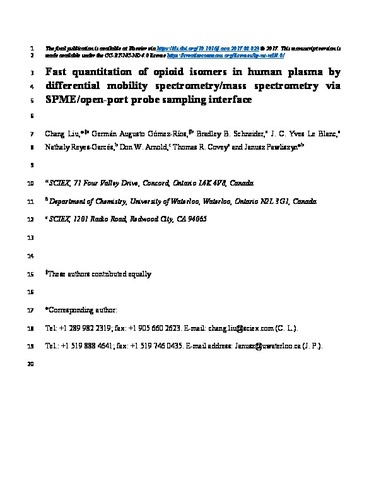| dc.contributor.author | Liu, Chang | |
| dc.contributor.author | Gómez-Ríos, Germán Augusto | |
| dc.contributor.author | Schneider, Bradley B. | |
| dc.contributor.author | Le Blanc, J. C. Yves | |
| dc.contributor.author | Reyes-Garcés, Nathaly | |
| dc.contributor.author | Arnold, Don W. | |
| dc.contributor.author | Covey, Thomas R. | |
| dc.contributor.author | Pawliszyn, Janusz | |
| dc.date.accessioned | 2018-05-18 16:58:02 (GMT) | |
| dc.date.available | 2018-05-18 16:58:02 (GMT) | |
| dc.date.issued | 2017-10-23 | |
| dc.identifier.uri | https://dx.doi.org/10.1016/j.aca.2017.08.023 | |
| dc.identifier.uri | http://hdl.handle.net/10012/13328 | |
| dc.description | The final publication is available at Elsevier via https://dx.doi.org/10.1016/j.aca.2017.08.023 © 2017. This manuscript version is made available under the CC-BY-NC-ND 4.0 license https://creativecommons.org/licenses/by-nc-nd/4.0/ | en |
| dc.description.abstract | Mass spectrometry (MS) based quantitative approaches typically require a thorough sample clean-up and a decent chromatographic step in order to achieve needed figures of merit. However, in most cases, such processes are not optimal for urgent assessments and high-throughput determinations. The direct coupling of solid phase microextraction (SPME) to MS has shown great potential to shorten the total sample analysis time of complex matrices, as well as to diminish potential matrix effects and instrument contamination. In this study, we demonstrate the use of the open-port probe (OPP) as a direct and robust sampling interface to couple biocompatible-SPME (Bio-SPME) fibres to MS for the rapid quantitation of opioid isomers (i.e. codeine and hydrocodone) in human plasma. In place of chromatography, a differential mobility spectrometry (DMS) device was implemented to provide the essential selectivity required to quantify these constitutional isomers. Taking advantage of the simplified sample preparation process based on Bio-SPME and the fast separation with DMS-MS coupling via OPP, a high-throughput assay (10–15 s per sample) with limits of detection in the sub-ng/mL range was developed. Succinctly, we demonstrated that by tuning adequate ion mobility separation conditions, SPME-OPP-MS can be employed to quantify non-resolved compounds or those otherwise hindered by co-extracted isobaric interferences without further need of coupling to other separation platforms. | en |
| dc.description.sponsorship | SCIEX | en |
| dc.description.sponsorship | Natural Sciences and Engineering Research Council (NSERC) of Canada | en |
| dc.language.iso | en | en |
| dc.publisher | Elsevier | en |
| dc.rights | Attribution-NonCommercial-NoDerivatives 4.0 International | * |
| dc.rights.uri | http://creativecommons.org/licenses/by-nc-nd/4.0/ | * |
| dc.subject | Differential mobility spectrometry | en |
| dc.subject | Open-port probe sampling interface | en |
| dc.subject | Opioid analysis | en |
| dc.subject | SPME-MS | en |
| dc.title | Fast quantitation of opioid isomers in human plasma by differential mobility spectrometry/mass spectrometry via SPME/open-port probe sampling interface | en |
| dc.type | Article | en |
| dcterms.bibliographicCitation | Liu, C., Gómez-Ríos, G. A., Schneider, B. B., Le Blanc, J. C. Y., Reyes-Garcés, N., Arnold, D. W., … Pawliszyn, J. (2017). Fast quantitation of opioid isomers in human plasma by differential mobility spectrometry/mass spectrometry via SPME/open-port probe sampling interface. Analytica Chimica Acta, 991, 89–94. https://doi.org/10.1016/j.aca.2017.08.023 | en |
| uws.contributor.affiliation1 | Faculty of Science | en |
| uws.contributor.affiliation2 | Chemistry | en |
| uws.typeOfResource | Text | en |
| uws.typeOfResource | Text | en |
| uws.peerReviewStatus | Reviewed | en |
| uws.scholarLevel | Faculty | en |


